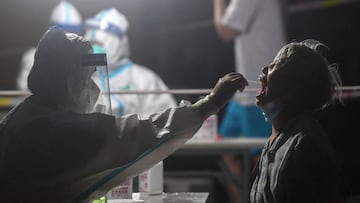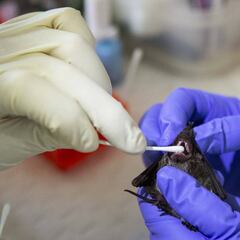Covid-19: WHO expert has new theory over Wuhan virus origin
Peter Embarek, one of the experts dispatched to Wuhan by the WHO to investigate the start of the covid-19 outbreak, has suggested another posible origin.

The World Health Organization (WHO) has a new hypothesis over the origin of the coronavirus outbreak. A team of WHO experts was dispatched to Wuhan at the beginning of the year to investigate possible causes of the initial outbreak, with suspicion falling mainly on a so-called wet market in the city where live animals were sold and the virus was thought to have made the jump to humans, most probably from a bat. However, there have also been suggestions the coronavirus could have originated in a laboratory - naturally or otherwise, as suggested by exiled Chinese virologist Li Meng-Yan - and this is a theory backed by Peter Embarek, one of the members of the WHO team.
In an interview with Danish broadcaster TV2, Embarek stated that the outbreak may have been triggered by a laboratory employee becoming infected by a bat-based coronavirus while working on the animal. “The infection of an employee while taking samples is one of the probable hypotheses,” he said. However, the expert added that the mission sent to Wuhan could find no definitive evidence to back this theory but that no possibility has been ruled out.
The WHO has called for international cooperation in the search for the origin of the coronavirus, which has caused over 4.3 million deaths worldwide since the outbreak started in last 2019.
WHO statement
WHO Statement on advancing the next series of studies to find the origins of the #COVID19 virus: https://t.co/fvBUw8ed5A
— World Health Organization (WHO) (@WHO) August 12, 2021
"The WHO calls for all governments to depoliticize the situation and cooperate to accelerate the origins studies, and importantly to work together to develop a common framework for future emerging pathogens of pandemic potential.
"Searching for the origins of any novel pathogen is a difficult process, which is based on science, and takes collaboration, dedication and time.
"WHO reiterates that the search for the origins of SARS-CoV-2 is not and should not be an exercise in attributing blame, finger-pointing or political point-scoring. It is vitally important to know how the COVID-19 pandemic began, to set an example for establishing the origins of all future animal-human spillover events."
In its final report based on the findings of its team of experts, the WHO said the most likely explanation for the coronavirus outbreak is a naturally occurring event with the virus making the jump from an animal host to humans, and that a laboratory-based accident was the least likely explanation. However, the WHO reiterated the need for transparency to try and prevent future global pandemics.
“Analysing and improving lab safety and protocols in all laboratories around the world, including in China, is important for our collective biosafety and security,” the report summed up.
China criticism
Danish scientist who led @WHO investigation in #China into #coronavirus origins says the possibility that Wuhan lab employee could have picked up virus while working in the field is a ‘likely hypothesis.' Calls for closer look at lab... @Telegraph:https://t.co/8joc2j9F94
— Sophia Yan (@sophia_yan) August 13, 2021
Chinese authorities have stressed they have always been open to cooperation in the search for the origin of the coronavirus but reject the politicization of such a search, state media quoted the country's vice foreign minister as saying on Friday.
China is continuing to conduct "follow-up and supplementary" research into the origins of the novel coronavirus as specified in a joint report with the World Health Organization (WHO) released earlier this year, said Ma Zhaoxu, according to Xinhua.
The WHO said on Friday it was setting up a new group to trace the origins of the coronavirus, seeking to end what it called "political point scoring" that had hampered investigations.
The inability of the WHO to say where and how the virus began spreading has fueled tensions among its members, particularly between China, where covid-19 cases were first identified in Wuhan in late 2019, and the United States.
Related stories
The WHO called for all governments to cooperate to accelerate studies into the origins of the covid-19 pandemic and "to depoliticize the situation".
It specified that a new advisory group called the International Scientific Advisory Group for Origins of Novel Pathogens would support "the rapid undertaking" of further studies.

